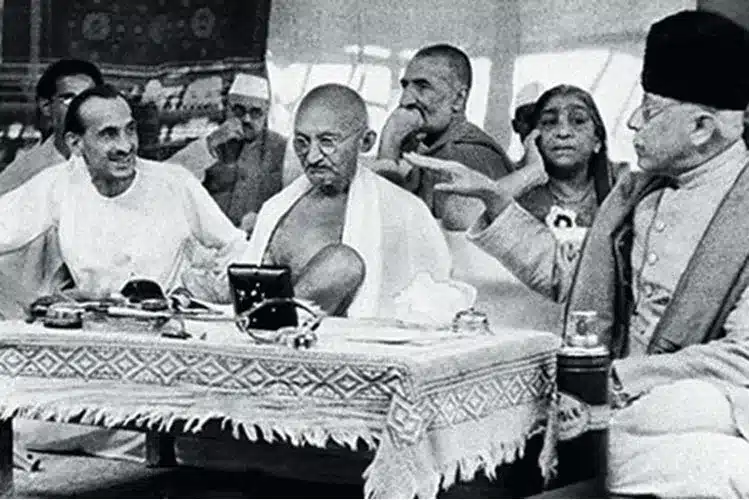Jivatram Bhagwandas Kripalani (11 November 1888 – 19 March 1982) known as Acharya Kripalani, was an Indian politician, noted particularly for holding the presidency of the Indian National Congress during the transfer of power in 1947. He was the husband of Sucheta Kripalani. He was an environmentalist, mystic, and independence activist who was long a Gandhian socialist, before joining the economically right-wing Swatantra Party later in life.
He was born on 11 November 1888 in Hyderabad which was part of the Bombay Presidency then. He completed his education at Fergusson College in Pune. Later, he worked as a schoolteacher before joining the freedom movement in the wake of Gandhi’s return from South Africa. From 1912 to 1917 Kripalani worked as a lecturer of English and history at L.S. College (then known as Grier BB College), Muzaffarpur, Bihar.
Kripalani was involved in the Non-Cooperation Movement of the early 1920s. He worked in Gandhi’s ashrams in Gujarat and Maharashtra on tasks of social reform and education, and later left for Bihar and the United Provinces in northern India to teach and organize new ashrams. He courted arrested on numerous occasions during the Civil Disobedience movements and smaller occasions of organizing protests and publishing seditious material against the British Raj.
He joined the All-India Congress Committee and became its general secretary in 1928–29 and served in that role for a decade. He was the President of the Indian National Congress during the transfer of power. Patel’s candidate Purushottam Das Tandon defeated Acharya Kripalani despite the support of Shree Pandit Nehru. Bruised by his defeat and disillusioned by what he viewed as the abandonment of the Gandhian ideal of a countless village republic, Kripalani left the Congress and became one of the founders of the Kisan Mazdoor Praja Party.
United Nations Call for Social Justice in the Digital Economy
Vituperative Election
In October 1961, Kripalani contested the Lok Sabha seat of V. K. Krishna Menon, then serving as Minister of Defence, in a race that would come to attract extraordinary amounts of attention. The Sunday Standard observed of it that “no political campaign in India has ever been so bitter or so remarkable for the nuances it produced”. Kripalani, who had previously endorsed Menon’s foreign policy, devoted himself to attacking his vituperative opponent’s personality, but ultimately lost the race, with Menon winning in a landslide.
Kripalani remained a critic of Nehru’s policies and administration while working for social and environmental causes. While staying active in electoral politics, Kripalani gradually became more of a spiritual leader of the socialists than anything else; in particular, he was considered to be, along with Vinoba Bhave, the leader of what remained of the Gandhian faction. He was active, along with Bhave, in preservation and conservation activities throughout the 1970s.
Acharya Kripalani died on 19 March 1982 at the Civil Hospital in Ahmedabad, at the age of 93.
Remembrance from the leader
The Prime Minister, Shri Narendra Modi remembered Acharya Kripalani for his contribution to India’s freedom struggle. On Acharya Kripalani’s Jayanti today, the Prime Minister lauded him for his great vision for our nation and his contributions towards environmental protection and social empowerment.
The Prime Minister tweeted:
“Acharya Kripalani was at the forefront of India’s freedom struggle under Bapu’s leadership. He had a great vision for our nation and worked to fulfil it as MP. He made immense contributions towards environmental protection and social empowerment. Remembering him on his Jayanti.”
Acharya Kripalani was at the forefront of India’s freedom struggle under Bapu’s leadership. He had a great vision for our nation and worked to fulfil it as MP. He made immense contributions towards environmental protection and social empowerment. Remembering him on his Jayanti.
— Narendra Modi (@narendramodi) November 11, 2021

